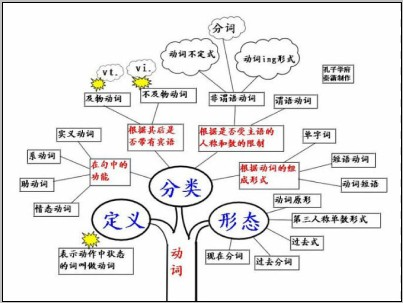本试题 “is known to us is that no one will those who are dishonest.[ ]A.As;respectB.What;respectC.As;admireD.What;hate” 主要考查您对动词
主语从句
等考点的理解。关于这些考点您可以点击下面的选项卡查看详细档案。
- 动词
- 主语从句
动词的定义:
表示动作中状态的词叫做动词。根据其在句中的功能,动词可分为行为动词、系动词、助动词和情态动词四类,有些动词是兼类词。
例如:We have lunch at 12. (have是行为动词)
We have been to NewYork. (have是助动词)
I am hungry. (am是系动词)
You need not have waited for me. (need是情态动词)
The door needs painting. (need是兼类词)
动词的分类:
1)表示动作中状态的词叫做动词。
2)根据其在句中的功能,动词可分为四类,分别是:
实义动词(Notional Verb)、系动词(Link Verb)、助动词(Auxiliary Verb)、情态动词(Modal Verb)。
说明:有些情况下,有些动词是兼类词。
例如:We are having a meeting. 我们正在开会。(having是实义动词。)
He has gone to NewYork.他已去纽约。(has是助动词。)
3)动词根据其后是否带有宾语,可分为两类,分别是:
及物动词(Transitive Verb)、不及物动词(Intransitive Verb),缩写形式分别为vt.和vi.。
说明:同一动词有时可用作及物动词,有时可用作不及物动词。
例如:She can dance and sing. 她能唱歌又能跳舞。(sing在此用作不及物动词。)
She can sing many English songs. 她能唱好多首英文歌曲。(sing用作及物动词。)
4)根据是否受主语的人称和数的限制,可分两类,分别是:
限定动词(Finite Verb)、非限定动词(Non-finite Verb)。
例如:She sings very well. 她唱得很好。(sing受主语she的限制,故用第三人称单数形式sings。)
She wants to learn English well. 她想学好英语。(to learn不受主语she的限制,没有词形变化,是非限定动词。
说明:英语中共有三种非限定动词,分别是:动词不定式(Infinitive)、动名词(Gerund)、分词(Participle)。
5)根据动词的组成形式,可分为三类,分别是:
单字词(One-Word Verb)、短语动词(Phrasal Verb)、动词短语(Verbal Phrase)
例如:The English language contains many phrasal verbs and verbal phrases. 英语里有许多短语动词和动词短语。(contains是单字动词。)
Students should learn to look up new words in dictionaries. 学生们学会查字典。(look up是短语动词。)
The young ought to take care of the old. 年轻人应照料老人。(takecareof是动词短语。)
6)动词有五种形态,分别是:
原形(OriginalForm)、第三人称单数形式(Singular From in Third Personal)、过去式(Past Form)、过去分词(Past Participle)、现在分词(Present Participle)。
动词知识体系:

主语从句的概念:
如果一个句子在复合句中充当一个主语,那么这个句子就是主语从句。主语从句通常由从属连词that,whether,if和连接代词what,who,whichwhatever,whoever以及连接副词how,when,where,why等词引导。that在句中无词义,只起连接作用。
主语从句用法:
1、主语从句的引导词:
主语从句通常由连词that和whether、连接代词或连接副词以及关系代词型what引导:
如:That he is still alive is a wonder. 他还活着,真是奇迹。
When we arrive doesn't matter. 什么时候到没有关系。
What we need is money. 我们需要的是钱。
What I want to know is this. 我想知道的就是这一点。
Whether they would support us was a problem. 他们是否会支持我们还是一个问题。
2、主语从句与形式主语it:
有时为了考虑句子平衡,通常在主语从句处使用形式主语it,而将真正的主语从句移至句末。这分三种情况:
(1)对于以连词that引导的主语从句,通常用形式主语代主语从句:
如:It's a pity that he didn't come. 很遗憾他没来。
(2)对于以连接代词(副词)引导的主语从句,可以使用形式主语代主语从句,也可直接在句首使用主语从句:
如:Whether they would support us was a problem. 他们是否会支持我们还是一个问题。
It was a problem whether they would support us. 他们是否会支持我们还是一个问题。
(3)对关系代词型what引导的主语从句,通常不用形式主语,总是主语从句放在句首:
如:What we need is money. 我们需要的是钱。
What I want to know is this. 我想知道的就是这一点。
(4)如果句子是疑问句,则必须用带形式主语it的结构:
如:Is it true that he is the girl's father? 他是那女孩的父亲,是真的吗?
How is it that you are late again? 你怎么又迟到了?
3、连词that的省略问题:
引导主语从句的连词that有时可省,有时不能省,其原则是:
若that引导的主语从句直接位于句首,则that不能省略;
若that引导的主语从句位于句末,而在句首使用了形式主语it,则that则可以省略:
如:That you didn't go to the talk was a pity. 很遗憾你没去听报告。(that不可省)
It was a pity(that) you didn't go to the talk. 很遗憾你没去听报告。(that可省)
主语从句应注意的几个问题:
1、that引导的主语从句既可放在句首,也可放在句尾,但在下列情况下that从句不可提前。
(1)在It is said/reported...that结构中:
如:It is reported that a bank was robbed yesterday.
(2)在Ithappened/occurred...结构中:
Ithappenedthattheteacherwasnotintheofficethatday.
(3)含主语从句的复合句是疑问句时:
如:Is it ture that you will give up the job?
2、下面这种情况常用it作形式主语。在It doesn't matter+what/whatever…结构中。
如:It doesn't matter what you say.
3、由what引导的主语从句谓语动词单复数问题 what引导的主语从句一般按单数对待,但是,在实际使用中究竟按单数还是按复数对取决于其成分的含义。
如:What we need is more time.
What were left behind were five empty bottles.
与“is known to us is that no one will those who are dishones...”考查相似的试题有:
- The secretary is very careful and never ________ any little points.[ ]A. noticesB. deletesC. overlooksD. undertakes
- The most serious problem we are facing now is how to ______ all the pollution.A.get rid ofB.get on withC.get throu...
- I was lucky enough to get on the train before it ________.A.pulled onB.pulled downC.pulled inD.pulled out
- —I have two tickets for the theatre on Saturday evening. Would you like to ______ me?—I’d like to, but I’m afraid I h...
- Mr. Smith______Jingzhou, and he has always had a good taste for the stories of Three Kingdoms.[ ]A. accumulatesB. aba...
- Mary always ________ she is the only one that does any work..A.stands outB.figures outC.makes outD.looks out
- — What field will your son go into after graduation from Nanjing University?— I'm not quite certain, but he ________ ...
- The taxi driver often reminds passengers to _____ their belongings when they leave the car.[ ]A. keepB. catchC. holdD...
- The time is not far away______modern communications will become widespread in China’s vast countryside.A.asB.untilC...
- ________my dear teacher couldn’t understand was ________ fewer and fewer middle school students showed interest in he...